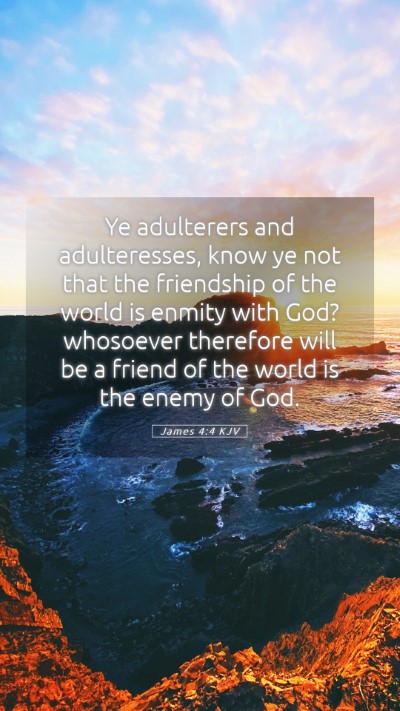Old Testament
Genesis Exodus Leviticus Numbers Deuteronomy Joshua Judges Ruth 1 Samuel 2 Samuel 1 Kings 2 Kings 1 Chronicles 2 Chronicles Ezra Nehemiah Esther Job Psalms Proverbs Ecclesiastes Song of Solomon Isaiah Jeremiah Lamentations Ezekiel Daniel Hosea Joel Amos Obadiah Jonah Micah Nahum Habakkuk Zephaniah Haggai Zechariah MalachiJames 4:4 Meaning
What is the meaning of James 4:4?
Ye adulterers and adulteresses, know ye not that the friendship of the world is enmity with God? whosoever therefore will be a friend of the world is the enemy of God.
James 4:4 Bible Verse Meaning
Understanding James 4:4: A Comprehensive Bible Verse Commentary
James 4:4
"Ye adulterers and adulteresses, know ye not that the friendship of the world is enmity with God? whosoever therefore will be a friend of the world is the enemy of God." (KJV)
Overview of the Verse
This verse from the Book of James captures a powerful message regarding the nature of our relationship with the world and with God. The author contrasts worldly friendship with a faithful commitment to God, emphasizing loyalty to divine principles over worldly desires.
Key Themes
- Adultery as a Metaphor: The term 'adulterers' is used metaphorically to signify unfaithfulness to God, suggesting that friendship with the world constitutes spiritual infidelity.
- Worldly Friendship: The verse posits that aligning oneself with worldly values directly opposes God’s will, creating enmity rather than harmony.
- Call to Loyalty: The crux of James's message is a call for believers to be wholly devoted to God, avoiding any compromise that could jeopardize their spiritual integrity.
Exegesis Insights
This section delves deeper into the meaning of James 4:4, utilizing insights from notable Biblical commentators.
Commentary Analysis
Matthew Henry
Matthew Henry emphasizes the seriousness with which God views the alignments of His people. In his interpretation, Henry illustrates that friendship with the world is not simply a choice but can be seen as a betrayal of divine covenant. He asserts that believers must strive for purity in their spiritual relationships.
Albert Barnes
Barnes adds to this understanding by noting the implications of 'enmity with God.' He explains that fostering ties with worldly priorities leads to conflict with divine will, thereby categorizing such relationships as enmities. This underscores the imperative for Christians to make deliberate choices about where they place their allegiance.
Adam Clarke
Adam Clarke provides a nuanced understanding of the Hebrew and Greek origins of the words used in this verse. He explains that the biblical metaphor of adultery is intended to call out those who seek to pursue both God and worldly pleasures, leading to moral and spiritual confusion.
Theological Implications
The theological implications of James 4:4 can lead to a profound reflection on one's spiritual life and priorities.
- Challenge of Dual Allegiance: This verse serves as a challenge to any believer who might be tempted to live a double life, asserting that true allegiance to God requires sacrifice of worldly attachments.
- Assessment of Priorities: It encourages individuals to evaluate their life choices and determine whether they align with God’s desires or the allure of the world.
- Call to Repentance: It highlights the necessity of repentance for those who may have strayed into friendship with the world and reconfirms the believer's need for renewal in their faith.
Practical Applications
How can we apply the teachings of James 4:4 to daily living?
- Cultivating Spiritual Discernment: Engaging in prayer and studying Scripture to discern where worldly influences may have taken root in our lives.
- Active Participation in Community: Involvement in Bible study groups can provide support in making decisions that reflect a commitment to God over the worlds.
- Setting Boundaries: Establishing clear boundaries to guard against influences that pull one away from a faithful walk with God.
Cross References
- 1 John 2:15-17: Discusses love for the world versus love for the Father.
- Romans 8:7: Emphasizes that the carnal mind is enmity against God.
- Matthew 6:24: States that one cannot serve two masters, further validating the theme of loyalty.
Conclusion
James 4:4 provides a penetrating look into the heart of the believer's commitment to God versus the pull of the world. The insights from renowned commentaries enrich our understanding and compel us to examine our own allegiances, urging a deeper engagement in biblical study and reflection.


